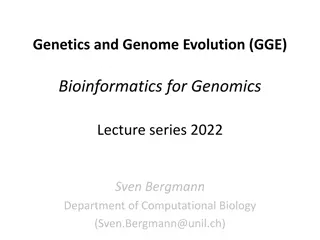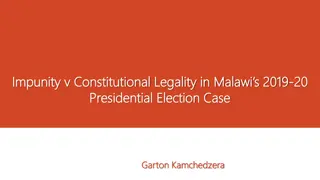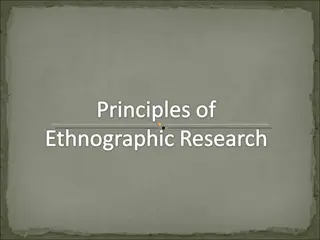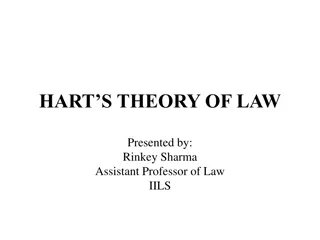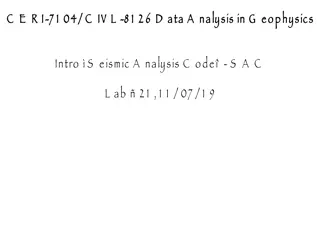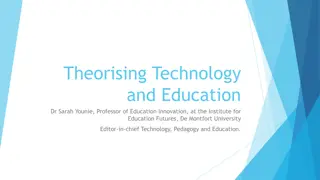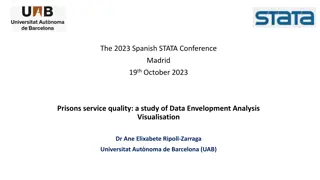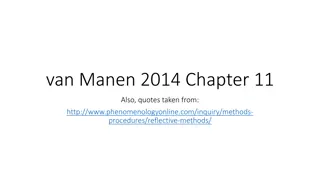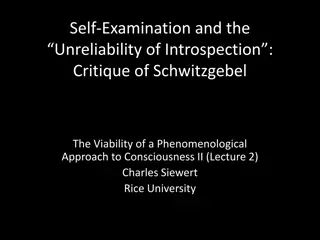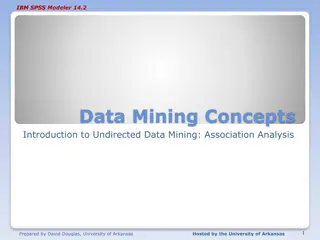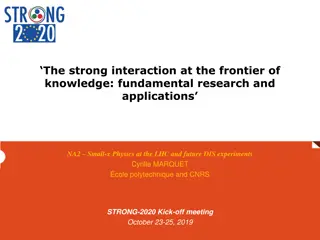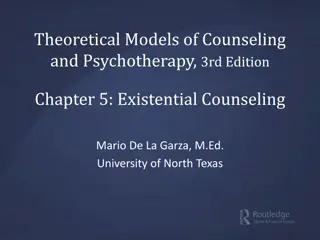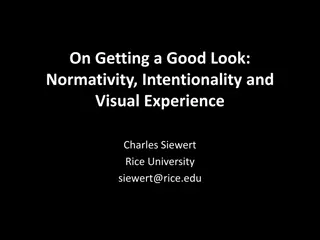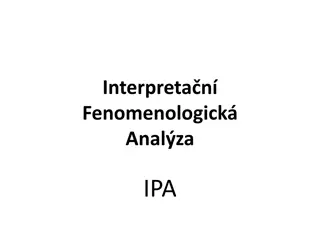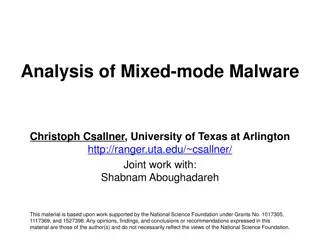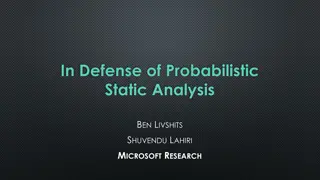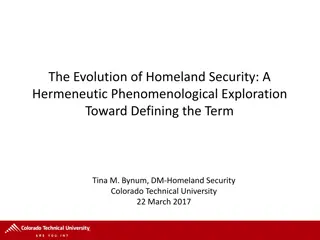Algorithm Analysis
Algorithm analysis involves evaluating the efficiency of algorithms through measures such as time and memory complexity. This analysis helps in comparing different algorithms, understanding how time scales with input size, and predicting performance as input size approaches infinity. Scaling analysi
1 views • 30 slides
Market Analysis (Project Formulation)
This detailed guide covers essential aspects of market analysis and project formulation in entrepreneurship, including feasibility analysis, techno-economic analysis, market demand analysis, steps in market analysis, and factors to consider for market demand analysis. Explore how to assess market de
2 views • 30 slides
Ginzburg Landau phenomenological Theory
The Ginzburg-Landau phenomenological theory explains superconductivity and superfluidity as distinct thermodynamic phases. It focuses on phase transitions characterized by singularities in specific heat at the transition temperature. Derived from BCS theory, it quantifies condensation energy, emphas
1 views • 38 slides
Static Analysis Techniques Overview
Explore static analysis techniques such as syntactic analysis, dataflow analysis, and model checking. Understand the concept of basic blocks in static analysis and their boundaries. Dive into the opportunities provided by static analysis in summarizing program behavior without executing it.
9 views • 27 slides
Bioinformatics for Genomics Lecture Series 2022 Overview
Delve into the Genetics and Genome Evolution (GGE) Bioinformatics for Genomics Lecture Series 2022 presented by Sven Bergmann. Explore topics like RNA-seq, differential expression analysis, clustering, gene expression data analysis, epigenetic data analysis, integrative analysis, CHIP-seq, HiC data,
0 views • 36 slides
Comprehensive Cost Management Training Objectives
This detailed training agenda outlines a comprehensive program focusing on cost management, including an overview of cost management importance, cost object definition, cost assignment, analysis, and reporting. It covers topics such as understanding cost models, cost allocations, various types of an
2 views • 41 slides
Impunity vs. Constitutional Legality in Malawi's 2019 Presidential Election Case
Explore the conflict between impunity and constitutional legality in Malawi's 2019 Presidential Election case. The concept, approach, and argument related to allopoietic law implementation, interpretative inquiry, and rejection of mediocrity are discussed in detail. The battle against impunity and m
0 views • 10 slides
Qualitative Data Analysis Techniques in Research
The purpose of data analysis is to organize, structure, and derive meaning from research data. Qualitative analysis involves insight, creativity, and hard work. Researchers play a crucial role as instruments for data analysis, exploring and reflecting on interview discussions. Steps include transcri
1 views • 27 slides
Understanding the Journeys of Excluded Children: Seminar Series on Theographs
Join Sarah Martin-Denham in a seminar series exploring the use of theographs to understand the experiences of children excluded from school. Dive into interpretative phenomenological analyses, research on school exclusions, and experiences of caregivers. Discover insights on barriers to mainstream s
0 views • 40 slides
Understanding Ethnography: Art and Science of Cultural Description
Ethnography is the method of describing a group or culture through up-close experience and participation. This social science research technique focuses on contextual, unobtrusive, and collaborative characteristics that involve interpretative analyses and organic interactions. Data collection is uns
1 views • 14 slides
H.L.A. Hart's Theory of Law: An Overview
H.L.A. Hart's theory of law, as outlined in his book "The Concept of Law," presents a unique perspective on the relationship between law and morality. Hart's concept differs from earlier legal positivist theories and he categorized later positivism into Inclusive, Exclusive, and Interpretative group
0 views • 11 slides
Legal Education and Judicial Ethics Seminar - Transforming Legal Cultures
Enhance your understanding of the CPR overriding objective and its interpretative mandates in the legal context. Explore concepts of substantive and procedural justice, principles of proportionality, and the judicial oath of office. Delve into the Supreme Law of the Bahamas, right to protection of t
0 views • 54 slides
Carl Rogers and the Self-Concept Theory
Carl Rogers, a prominent figure in personality theory, emphasized individuals' constructive potential and the impact of their subjective experiences on personality development. He viewed individuals as goal-directed and capable of change, with the environment playing a facilitating or inhibiting rol
1 views • 78 slides
Understanding Viscoelasticity and Relaxation in Amorphous Materials
Dive into the world of viscoelasticity and relaxation in amorphous materials, exploring concepts like complex shear modulus, Maxwell element, and phenomenological models. Discover the intriguing nature of glass, its transition between solid and viscous states, and the various theories surrounding it
1 views • 34 slides
Dependent Case Theory in Japanese Linguistics
Dependent case theory challenges traditional views on case assignment, particularly in the context of Japanese grammar. This theory argues for a different approach to case assignment based on interpretative processes rather than licensing conditions. The theory is explored in-depth, discussing neces
0 views • 40 slides
Introduction to Data Analysis in Geophysics with Seismic Analysis Code - SAC Lab 2.1
Explore the world of geophysics data analysis using the SAC Lab 2.1 code. Learn about seismic analysis, Fourier transform analysis, spectral analysis, color tracing, integration, differentiation, and more. The SAC online documentation provides valuable resources for users to delve deeper into this f
0 views • 45 slides
The Role of Fun in Adult Learning: Insights from Research
Explore the impact of fun and enjoyment on adult learning programs, investigating the perspectives of both learners and teachers. Discover how positive emotions, challenge, achievement, and intrinsic motivation contribute to a better educational experience. Through phenomenological research, delve i
0 views • 10 slides
The Role of Theory in Educational Technology: A Deep Dive into Phenomenological Perspectives
Dr. Sarah Younie discusses how theories shape our observations in technology and education, exploring epistemological perspectives and the importance of theory in pedagogic practices. A case study on teachers' integration of technology highlights the significance of theory in understanding phenomena
3 views • 9 slides
Data Analysis and Passage Analysis Project Proposal
This project proposal by Anthony Yang focuses on developing a Java program for data analysis and passage analysis. The motivation behind the project is to gain more knowledge in computer science and statistics-related topics while utilizing technology to extract useful insights from data. The propos
0 views • 8 slides
Exploring Orto-Computing: Bridging the Gap Between Formal and Phenomenological Computing
Meaningful experiments suggest a transition from the formal, Turing-based approach to a structural-phenomenological one called Orto-Computing. This innovative concept integrates mind-matter interaction and non-formal functions within computational systems, offering potential solutions to complexity
0 views • 18 slides
Efficiency Methodological Approaches in Prisons Service Quality Study
Exploring efficiency methodologies in analyzing prisons service quality, this study focuses on parametric and non-parametric approaches such as Data Envelopment Analysis (DEA) and Stochastic Frontier Analysis (SFA). It delves into benchmarking techniques, productivity analysis, and the implications
0 views • 21 slides
Understanding Reflective Methods in Phenomenological Research
Reflective methods such as phenomenological interviews, data-interpreting hermeneutic interviews, and thematic reflection are explored in this content, highlighting the importance of descriptive writing and entering a person's lifeworld to gain deeper insights. The advice on conducting phenomenologi
2 views • 15 slides
Understanding Apocalyptic Literature in Revelation
Explore the fascinating genre of apocalyptic literature through an in-depth study of the Book of Revelation. Delve into the historical background, interpretative approaches, and essential elements of this profound genre that envisions the end times. Discover how apocalypticism merges earthly circums
0 views • 39 slides
The Phenomenology of Temperature Awareness in Distance Running
Researchers at the University of Gloucestershire explore the embodied consciousness of distance runners, focusing on thermoception and temperature regulation. Utilizing sociological phenomenology and phenomenological ethnography, the study delves into the sensory experiences of runners, emphasizing
0 views • 29 slides
145th Caribbean Fisheries Management Council Meeting Action Summary
The 145th Caribbean Fisheries Management Council Meeting focused on law enforcement priorities, concerns among commercial fishers, and the workshop's action plan to optimize management efforts through collaboration. Key points included establishing partnerships with DNER staff and Ranger Corps, impr
0 views • 5 slides
Understanding the Relationship Between Cost Benefit Analysis and Financial Analysis
The intersection of cost benefit analysis and financial analysis is crucial for evaluating projects, with economic analysis focusing on incremental benefits and costs while financial analysis ensures sustainability. Perspectives like those of the government, utility manager, and private lender shape
0 views • 8 slides
Understanding Retained EU Law and Legislation Post Brexit
Explore the implications of the EU Withdrawal Act 2018 on retained EU law, including preserved, converted, and EU-derived domestic legislation. Learn about the interpretative role, general principles, and case law retention, as well as the conversion of Direct EU legislation into domestic law. Under
0 views • 18 slides
Critique of Self-Examination and Unreliability in Introspection
The discussion revolves around the viability of a phenomenological approach to consciousness, critiquing the reliance on introspection and the unreliability of first-person judgments. The argument favors plain, analytical phenomenology over heterophenomenology, highlighting the challenges posed by f
0 views • 28 slides
Introduction to IBM SPSS Modeler: Association Analysis and Market Basket Analysis
Understanding Association Analysis in IBM SPSS Modeler 14.2, also known as Affinity Analysis or Market Basket Analysis. Learn about identifying patterns in data without specific targets, exploring data mining in an unsupervised manner. Discover the uses of Association Rules, including insights into
0 views • 18 slides
Exploring Small-x Physics at the Frontier of Knowledge: Strong Interaction Research
Delve into the forefront of knowledge with fundamental research and applications in Small-x Physics at the LHC and future DIS experiments. The STRONG-2020 kick-off meeting in 2019 marked the collaboration of 15 institutions from 9 countries, aiming to enhance communication and collaboration in the t
0 views • 10 slides
Understanding Existential Counseling: Philosophy and Practice
Existential counseling is rooted in the philosophy of existentialism, focusing on concepts such as responsibility, freedom, and the unique subjective perspective of each individual. Rollo May's influence in this approach, along with the ontological and phenomenological underpinnings, shape the under
0 views • 24 slides
Introduction to Static Analysis in C.K. Chen's Presentation
Explore the fundamentals of static analysis in C.K. Chen's presentation, covering topics such as common tools in Linux, disassembly, reverse assembly, and tips for static analysis. Discover how static analysis can be used to analyze malware without execution and learn about the information that can
0 views • 54 slides
Understanding Transactional Analysis in Human Relationships
Transactional Analysis (TA) is a method developed by Eric Berne to analyze communication between individuals. It helps in understanding human relationships by categorizing interactions into different ego states like ID, Ego, and Super-Ego. TA provides valuable insights into personalities, aids in re
0 views • 52 slides
Exploring Normativity and Visual Experience in Consciousness Philosophy
Charles Siewert from Rice University delves into the intersection of normativity and sensory experience within the realm of consciousness philosophy. He discusses the nonreductionist stance, a phenomenological approach, and the relationship between sensory experiences and judgments. The concept of g
0 views • 44 slides
Understanding Interpretative Phenomenological Analysis (IPA) in Research
Explore the process and criticism of Interpretative Phenomenological Analysis (IPA) in research, emphasizing the qualitative methodology and its application in understanding life experiences and general themes. Delve into the theoretical foundations, challenges, and recommendations for innovative re
0 views • 13 slides
Comprehensive Credit Analysis Process for Risk Management
Explore the credit analysis process for effective risk management, covering aspects such as requested amounts, profitability analysis, collateral analysis, industry analysis, and both quantitative and qualitative analyses. Learn about the key parameters considered in establishing internal ratings an
0 views • 45 slides
Industrial, Microbiological & Biochemical Analysis - Course Overview by Dr. Anant B. Kanagare
Dr. Anant B. Kanagare, an Assistant Professor at Deogiri College, Aurangabad, presents a comprehensive course on Industrial, Microbiological, and Biochemical Analysis (Course Code ACH502). The course covers topics such as Industrial Analysis, Microbiological Analysis, and Biochemical Analysis. Dr. K
0 views • 16 slides
Analysis of Mixed-Mode Malware and Malware Analysis Tools
This analysis delves into mixed-mode malware, detailing its two phases and potential impact on malware analysis tools like TEMU. It explores scenarios where malware attacks analysis tools, emphasizing the challenges faced in observing and preventing malicious behavior. The study also highlights vari
0 views • 14 slides
Benefits of Probabilistic Static Analysis for Improving Program Analysis
Probabilistic static analysis offers a novel approach to enhancing the accuracy and usefulness of program analysis results. By introducing probabilistic treatment in static analysis, uncertainties and imprecisions can be addressed, leading to more interpretable and actionable outcomes. This methodol
0 views • 11 slides
Understanding the Evolution of Homeland Security: A Hermeneutic Exploration
This study delves into the evolution of homeland security through a hermeneutic phenomenological approach. It examines how the term has been defined, managed, and linked to SMART goals in various documents from 1999 to 2015. Considerations are given to different management styles and biases that may
0 views • 12 slides




